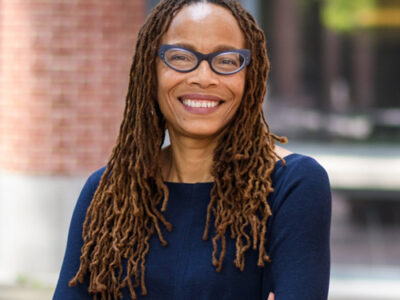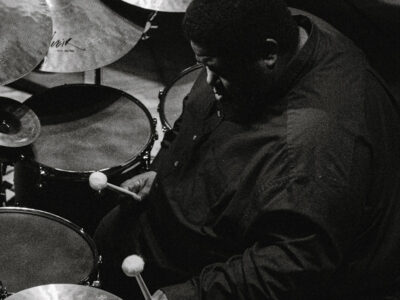Skinhead attacks, Victorian death masks and some delightful new friends were all part of a Thouron Fellow’s mind-expanding year in England.
By Lorene Cary
WHEN I STUDIED at the University of Sussex in England on a Thouron Fellowship in 1978-79, I developed the habit of stopping for sundries at the shop of a chatty tobacconist on the main road to school. He loved to hear me talk, he said. I didn’t pay him much mind. The people at the pub, my neighbors, and new friends told me repeatedly that I sounded like Hollywood come to life. But then, a few days later, the tobacconist elaborated: what he was trying to do was commend my speech over that of his other “colored” patrons, whose accents, he said, were so thick that he often could not understand them at all.
Standing in the crowded shop, holding my tin of Golden Virginia tobacco and salmon-colored Guardian newspaper, I reminded myself that the Thouron Award was granted so that British and American students would promote understanding between peoples by acting as informal ambassadors. So instead of rolling my eyes and walking out, I explained patiently that like him, I spoke English as my first — and only fluent — language, whereas the Africans generally spoke as many as five or six. He responded, just as patiently, that he knew all about that, but was getting at something altogether different. I was to be congratulated, he said, because I’d overcome “an ‘andicap”:
“It’s the lips.”
This was the first time I’d ever laughed outright at a racist (“Laugh if you will…”); it was a liberating experience.
We did not laugh, however, the night skinheads busted up the party DJ-ed by my friend Albert Chambwe, who called himself by the American-sounding moniker Al Jackson when he was behind his turntables. In a surreal moment in the red-tinted darkness, I saw a few young white men run in, and suddenly everyone was running and screaming. I heard thudding, but could not see. Albert pushed me out the back door fast.
No one was hurt above a few bruises, but we remembered it when we went into town together to “discos,” as they called the clubs where reggae and Afro-pop boomed through our bodies like heartbeat. Someone always stayed sober — not only to drive home but to keep a lookout. Sussex University, though it had a reputation for leftist politics, was just three miles outside of Brighton-by-the-Sea, a gingerbready Victorian resort city where the radical right that year held a conference that left inch-high swastikas pencilled on public loo stalls and the odd whitewashed wall. What a difference from the university itself, with its diverse and growing international contingent, its punks and socialists, and its history of student protest.
Having had an intensely unsettling experience at St. Paul’s, a New England boarding school modeled after Eton and Harrow, I recoiled from the idea of attending a college in Oxford or Cambridge. Sussex, one of the new “red-brick” universities, characterized as Britain’s Berkeley by someone in the Office of International Programs, seemed to be the Anti-Oxbridge. And I hankered to get to know the country, not a college behind gray stone walls.
None of this reasoning, however, was quite so careful as spelling it out makes it sound. The fact is that I’d applied for the Thouron at the last minute, and then only because my boyfriend hesitated to apply without me. We each made finalist and traveled together on the bus to the New Jersey country club where for two days we sat through group and individual interviews and presentations, and ate meals and socialized with members of the selection committee and other candidates. It was supposed to be fun. They kept saying that. Even if we didn’t get the award we would have had a lovely weekend with interesting peers. I felt like an exhibit.
We heard that the awards went to the swingers, so someone — I no longer remember who — sent out for a case of beer and held a room party, which was quiet at first, but then grew louder. We had more interviews scheduled for the next day. My roommate was nearly in tears with sleeplessness, and I was angry. A seasoned resident advisor, I went to tell them to quiet down — and found a perfectly delightful gathering, with Tiger Thouron part of the merriment. I made my request rather sheepishly, and they invited me to stay. (Some of the people in the room won awards, by the way; the majority did not.)
I approached the whole application process with similar humorlessness, earnest as the Victorians I would study, in a rush, like a job candidate with a mortgage and a light-bill to cover, and with expectations tamped down and an upper lip quite stiff indeed, ‘andicap or no. When I received the Thouron and my boyfriend did not, it was as if I’d found money in the road at someone else’s expense. That was the dirty secret of found money, of course, even fellowships.
Suddenly I wanted very much to go.
My classes in Victorian literature gave way after the first few months to individual tutorials. Then began the luxurious ritual of weekly meetings with brilliant and witty men who always seemed vaguely amused by whatever nonsense I’d thought up in the past six days.
Later I visited the British Museum in London to read original papers of Mrs. Humphrey Ward, whose best-selling l888 novel Robert Elsmere, about a country vicar’s loss of faith, provoked international copyright laws when an American company pirated chapters as give-away promotions with bars of soap. At Oxford’s Pugh House, I read Mrs. Ward’s correspondence. On top of the shelves along the walls Victorian death masks, some boxed, some not, kept me company.
Fifteen years later, while writing a novel about free black Philadelphians, I could still feel the thrill of holding those thin letters in my hands, reading Mrs. Ward’s letter in indigo and Prime Minister Gladstone’s response, written between her lines in order not to waste paper. The literal feel of the letters and the immersion in Victorian writing gave me a sense of the century that was invaluable to writing a novel set in the 1850s. But not until I began to create a contemporary black Episcopal priest — a woman — who has lost her early, tentative belief in the divinity of Jesus did I know how thoroughly Robert Elsmere’s story had watered my own spirit.
Thw Thouron year is a luxury, privilege on top of privilege. When someone in the host country buys you a drink, the Thouron people say, you can buy them one back. You can travel. For me, as for an American Thouron Fellow from the sixties quoted in a fellowship brochure, the award “was a respite from the looming spectre of professional school and money, money, money.” A British scholar saw it slightly differently. In England he was “being trained for one kind of elite, and in America for another, the difference being due to a national difference of philosophy as to what, exactly, is the elite.”
Philosophies aside, the Thouron program has been a blessing for Penn students, sending them to universities throughout Britain, and returning the favor by bringing British students to the University. Begun in 1960 by Sir John Rupert and Esther du Pont Thouron, it is now administered by Penn, with the continued involvement of the next generation, especially Tiger Thouron and Jane Whitehead Thouron, G’73-’76. The 560 Fellows have included a large contingent of scholars, writers, journalists, politicians, administrators, and what have you.
Having been schooled in the Black Arts Movement and concerned since leaving home at sixteen that I’d find myself cut off one day from the community that gave birth to me, I accepted the award with gratitude — but also a wary ambivalence. I don’t remember attending all the get-togethers organized in London to make us feel at home. I even went so far as to invite my boyfriend over for the second half of the year and to travel south, Eurail-style, with me — which was quite against the letter of the award and the spirit.
And yet, looking back, I think that I did indeed fulfill the mission. Carole S. Clarke, who is responsible for fundraising and alumni relations for the Thouron Award, says that she hears from past and present Thouron scholars “a constant theme of opening up.” She mentions an American named Henry Smith, W’67, who went to Edinburgh to study political economy, discovered the arts, attended the Royal Academy of Dramatic Arts, and now performs as a dancer and choreographer. Duncan Kenworthy, ASC’73, producer of Four Weddings and a Funeral, told Clarke that coming to the U.S. and studying at Annenberg led him to Jim Henson’s Muppet Studio, which pointed him toward more work in film.
My opening up, like most, was cultural, political, and also intensely personal. I was able to pay close and delicious attention to the texture of days: the colors of rain; the grey cloud that hung over the the council houses where poor people were allowed to burn untreated coal, rather than the more expensive, so-called smokeless kind; the taste of cream off thick milk bottles made of old, scratched, cloudy glass; the pungent mildew of my mattress and the cheering crackle of our winter fire; the brave, Charlie-Chaplin walk of my little landlord, who kept tin foil inside his scooter helmet just as he did to protect against German bombs; the sharp, breathless glottal stops of a post-doctorate Egyptian scholar, Dr. Ali, as we called him, who took us younger students under his wing and offered coffee or tea — “Shay aw qahwa?” — and unfailing hospitality whenever we ducked into his doorway.
I paid attention to hot baths in the basement for which I paid fifty pence into the meter on our water tank and waited forty minutes for the water to heat. I savored the yeasty effervescence of John Courage lager and perfect, smoky, single malt Scotch. I listened carefully to the crackly radio on the mantel in the kitchen as Margaret Thatcher intoned “We are being swamped” by immigrants, in one campaign speech after another, and swept in the conservative party just a year before Ronald Reagan’s victory here.
Sitting by the coal fire, switching chairs to warm one side of my body, then the other, I rediscovered my love of fiction-by-the-pound: Charles Dickens’ raucous humor and maudlin middle-class melodrama; the loving mercilessness of George Eliot and the rest of my favorite manic prose producers of the age: Mill, Matthew Arnold, Ruskin, Carlyle, Mrs. Ward, not to mention Darwin, who set so many scurrying to preserve goodness and light once science triumphed over Christianity. As I read the Victorians, and lived in the world they’d helped make, I could begin to pick out the society’s puzzling coherence and dissonance. My Scottish girlfriend’s sister seemed a direct descendant of Hardy’s characters when she would come visit wearing a sheet-cape that she’d covered with bits of pinned-on reddish rags.
“It’s grrreat, in’t it?” Louise would say.
“But what’s it mean? I don’t think I get it, really.”
“Aw, Christ, just say it’s ugly. It’s sup-pused to be ugly. That’s the bloody point.”
From the house that I shared with Max, the Xhosa student who lived downstairs and felt as much like a brother as any friend ever has, it was three miles out of town to University. At first, I’d ride the bus and sit on the top deck, if it wasn’t raining, or I’d join my friends in hitching a ride. Then, I began to walk. All fall glorious golden sunshine warmed the Downs — everyone commented on it that year. Groves of old trees erupted out of the crazy quilt meadows where sheep and red-brown cows noted my passing with raised heads. Late-season raspberries ripened along some of the paths. When I ate them, they were warm from the sun. My fingers turned purple.
My African friends would bring meat wrapped in newspaper for me to cook, and we’d eat it while telling stories about home: a man named Singh explained what was good about arranged marriages; Omotunde Mahoney told how the young men would discipline women in the Gambia who bleached their skin — generally hands and faces only, due to the expense of the cream. When they saw such a woman on the bus, they’d slap her hand and then say: “Oh, pardon me. I thought some impertinent person had put a hand on your knee.”
We all talked about home, and once, when I was describing a course I’d taken at Penn with a South African professor, Ezekiel Mphahlele, we realized that four of us had all studied with the same man in different countries. Another time, discussing the movement of Christianity across continents, I spoke about a hymn we sang in my African Methodist Episcopal church. I was no more than four or six measures in when three friends began to sing it, too, each in a different language. When we finished we sat silently, too moved to disturb the air with comment.
We listened incredulously to radio broadcasts about the progress of talks to dismantle Rhodesia and create Zimbabwe. My friends contemplated liberation and their roles in it. Albert, the psychologist who has since died of a sudden illness, planned mental-health conferences to help his people heal from war. (“Hey. After everything that has happened,” he’d say, “you’d have to be crazy not to be crazy!”) Richard, an insightful and compassionate British friend, now with the European Economic Union in South Africa, never failed to question how their struggles challenged him and me to understand and improve our own more settled and opaque systems. Sirenya, Haetswe, Chambwe, Mwikisa, Ali, Johnson: I’ll remember the names and the lessons as long as I remember anything.
Despite my ambivalence, despite my failure to follow the Thouron guidelines expressly, I still learned exactly what everyone else, British and American, reports in Fellowship brochures: a new “freedom from blind chauvinism.” Like a museum curator who told me he spent early years in Europe “just looking,” filling his eyes with Western art, I was graced to fill myself with the company of open, searching, funny, dead-serious people — and to discover a more critical, global perspective on my own nation.
LORENE CARY, C/G’78, a lecturer in creative writing at Penn, is the author of Black Ice, a memoir, and The Price of a Child, a novel; her next novel, Pride, will be published next March by Nan A. Talese/Doubleday.




